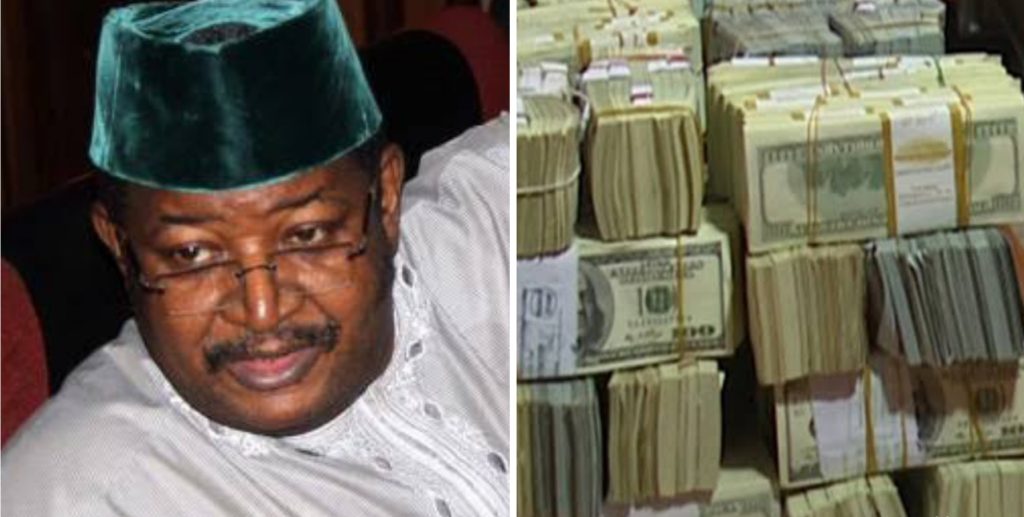The Federal High Court in Abuja on Thursday dismissed an application by the Economic and Financial Crimes Commission (EFCC) to cross-examine former Group Managing Director (GMD) of the Nigerian National Petroleum Corporation (NNPC), Andrew Yakubu.
Justice Ahmed Mohammed, in a ruling, sustained the objection raised by Ahmed Raji (SAN), counsel to Yakubu.
The News Agency of Nigeria (NAN) reports that Raji had, on July 22, disagreed with the EFCC’s lawyer, Mohammed Abubakar, on his plan to cross-examine his client, who is the first defence witness (DW1), based on Exhibit “J”.
Exhibit J borders on a case with the suit instituted by the anti-graft agency in 2016 before Justice Nnamdi Dimgba when Yakubu was GMD of NNPC.
The case, which is still ongoing, involves an oil company, Atlantic Energy Brass Development Limited, in which Yakubu was initially the seventh defendant in the suit and was later dropped to become the first prosecution witness, in the matter bordering on illegal lifting of crude oil.
Raji had argued that Exhibit J, which the EFCC lawyer planned to take Yakubu on, was irrelevant to the case.
He objected to the propriety of the prosecution to cross-examine the ex-GMD on the exhibit, which he said was tendered in respect of counts one and two, which had been struck out pursuant to the orders of the Court of Appeal in its judgment, dated April 24.
According to Raji, counts one and two, having been struck out by the Court of Appeal, Exhibit J, which was tendered thereof, has become irrelevant as far as counts three and four are concerned.
NAN reports that the EFCC had, in 2017, raided the residence of the ex-NNPC boss in Kaduna State and found $9,772,800 and 74,000 Pounds ($9.7 million and 74,000 Pounds) in a safe.
Yakubu was arraigned on March 16, 2017, on six counts but was ordered by the Court of Appeal to defend counts three and four, which bordered on failure to make full disclosure of assets, receiving cash without going through a financial institution and intent to avoid a lawful transaction.
The EFCC alleged that the offence contravened the provisions of Section 1(1) of the Money Laundering Act, 2011 and punishable under Section 16(2)(b) of the Act.
In his ruling on Thursday, Justice Mohammed said it was not in doubt that by the judgment of the Court of Appeal alluded to above, the defendant (Yakubu) was specifically ordered to enter his defence on counts three and four only while being discharged of other counts.
“To determine whether Exhibit J is relevance for determination of counts three and four, I deem it as expedient at this stage,” he said.
Alluding to counts three and four, the judge held that it was alleged that Yakubu received the cash payments of $9.7 million and 74,000 Pounds and thereby committed an offence punishable under the relevant Act.
Justice Mohammed, who cited sections of the Evidence Act, described relevance as logically connected and tending to prove or disprove a matter or an issue.
The judge held that relevancy is the heart beat of laws of evidence.
“I equally find no hesitation in discountenancing the submission of the learner counsel to prosecution that the case applies only to civil cases,” he said.
He upheld the argument of the defence counsel that there was a limit a party could be allowed to cross-examine a witness.
The judge ruled that Exhibit J was not relevant to the proof or disproof of counts three and four of the charge for which the defendant was standing trial.
“To allow the prosecution to cross-examine the defendant on the contents of Exhibit J, which have already found to be irrelevant will amount to absolute waste of precious judicial time,” he said.
Justice Mohammed, who noted that counsel to the prosecution was only approbating and reprobating in his argument, therefore sustained the objection of the defence counsel.
“The prosecution is not allowed to cross-examine the DW1 on the contents of Exhibit J which exhibit is not relevant to counts three and four now pending before the court,” he ruled.
The judge adjourned the matter until November 30 for trial continuation.
NAN reports Abubakar told the court that Exhibit J was relevant in proving whether or not there had been a predicate offence to counts three and four.
According to him, we further submit that the same Exhibit J is also relevant to some matters which DW1 has testified about both in evidence-in-chief and under cross-examination.
